#property management in greece
Text
0 notes
Text
WHAT HAPPENED TO COUNTESS MARIA OF SALONA?
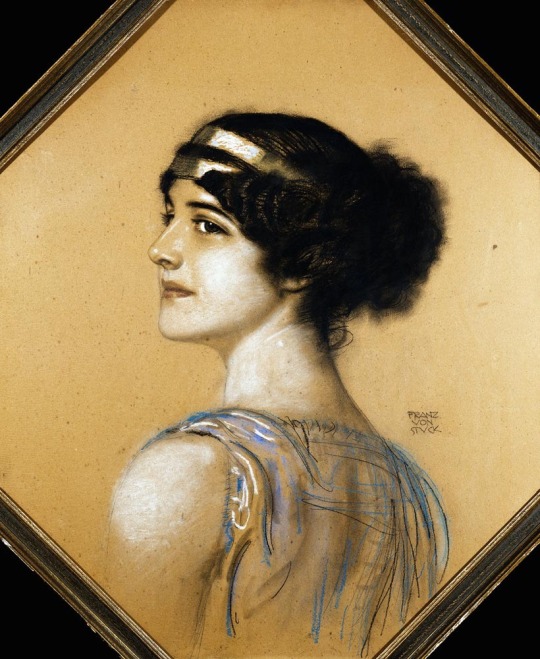
Maria Fadrique was born around 1370, the daughter of the last Catalan Count of Salona, Don Louis Fadrique, and his Greek wife, Princess Helena Fadrique, also known as Helena Kantakouzene or The Despina, Helena Asenina.
Not much information about her early childhood has been preserved. We do know that she grew up as an only child to the noble couple and was likely prepared and claimed as the only heir to the County of Salona.
In 1382, at the age of 12, she succeeded her father and became the Countess of Salona in her own right. However, due to her age, she was deemed too young to manage the county, so her mother, the Dowager Countess Helena Fadrique, took charge as regent. That same year, she was betrothed to Bernat Hug, a son of Felip Dalmau, but the betrothal was annulled.
Despite reaching the age of maturity in 1386, at 16, an age when she was now deemed fully capable of managing the County of Salona, her mother remained in power over all state affairs, and Maria had yet to step a toe into the world of politics. That same year, her mother betrothed her to a son of the Serbian Emperor Symeon Uros for political reasons, but this betrothal, like the first one was annulled. That same year, she was betrothed to an alienated associate of the King of Aragon, but the wedding never took place.
From the years of 1388-1391, Helena refused to repay damages to a Venetian citizen who suffered the loss of property aboard a ship from Ancona by her late husband, Don Luis Fadrique, in 1380. This made her mother very unpopular with Venice.
Her mother was quite hated by the people, who most likely would have preferred Maria to take charge over state affairs, but this never happened. Even at the age of 20, Maria had not taken charge over state affairs. This decision to keep the Dowager Countess in charge would eventually cause their deaths.
Though Necdet Sakaoğlu in his work “Bu Mülkün Kadın Sultanları” claims she was betrothed to Manuel II in 1393, I have not seen another source to confirm this claim.
In this same work, Sakaoğlu tells the story of the capture of Maria and her mother in late 1393 or early 1394. “Turkish soldiers captured the Frankish ship that was bringing Maria to Istanbul in the Dardanelles and captured its occupants.” - Necdet Sakaoğlu, “Bu Mülkün Kadın Sultanları,” pg 88.
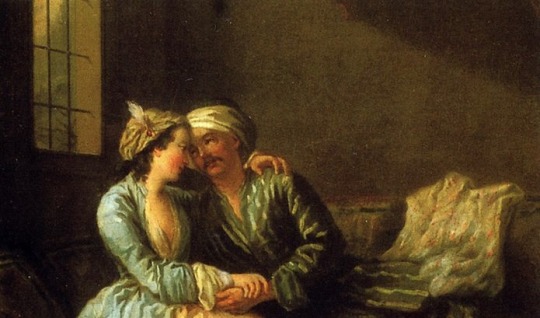
Upon meeting the beautiful and affianced Countess, Sultan Yildirim Bayezid Han was smitten with her, and both the mother and the daughter were brought to his harem in Edirne, and Maria became his concubine, yet in other accounts he actually married her.
The Italian pilgrim Nicholas of Martoni, returning from Jerusalem by way of Greece in 1395, crossed the Gulf of Corinth from Vostitza (Aigion) to Vitrinitza in April. He was told that the district of Vitrinitza was then held by "the Grand Turk" who had acquired it from the lord of Salona ("Dominici de Sola") whose only daughter he had married. The Byzantine Family of Kantakouzenos (Cantacuzenus) Ca. 1100-1460: A Genealogical and Prosopographical, pg 163.
That same year in 1394, Helena died, but it is not clear if it was due to an execution or other reasons. According to Laonikos Chalkokondyles, the Countess Helena disgraced herself and brought shame upon the people of "Delphi" by committing her authority into the hands of her lover, a priest called Strateus, for which reason the Archbishop of Larissa denounced her to the Basileus (Sultan) and gave him the pretext for taking over the County of Salona. - The Byzantine Family of Kantakouzenos (Cantacuzenus) Ca. 1100-1460: A Genealogical and Prosopographical, pg 161.
As for Maria, she was executed a year later in 1395 after Bayezid allegedly found her unworthy of him, and eventually lost interest in her. However, this reason seems highly improbable.
When Bayezid lost interest in her, he wouldn’t have executed her but instead discarded her or even sent her away to the old palace in Bursa. The reason for her execution must be something else, either she was executed for political reasons or she went against the rules or even committed a crime, or even struck his ego in the wrong place. Nonetheless, it is highly unlikely for a Sultan to execute a concubine/wife of his because he lost interest in her.
( Sources: The Byzantine Family of Kantakouzenos (Cantacuzenus) Ca. 1100-1460: A Genealogical and Prosopographical, Necdet Sakaoğlu, “Bu Mülkün Kadın Sultanları".)
#geology#Hatun#royalife#BayezidI#Bayezid I#sultan bayezid#Bayezid The Thunderbolt#Bayezidthethunderbolt#Yildirim Bayezid#YildirimBayezid#Yıldırım Beyazıt#YıldırımBeyazıt#Assembly#Sultan Yildirim Bayezid Han#Countess Maria#Maria of Salona#Countess Maria of Salona#Helena Fadrique#ottoman empire#County of Salona#Aragon#Count Louis Fadrique#history#Helena Kantakouzene#Helena Asenina#concubine#osmanlı#Sultan#Imperial Harem
84 notes
·
View notes
Note
okay so like maybe 7th year Sebastian but like taking a fluffy shower together? Like he's all like 😍😍😍 and MC is like 🤭🤭🤭 iykwim
My sweet anon 😭 My poor little nonny. You sent this ask, like, a month ago, and I just barely now got to it. I'm so so sorry. I really was caught up in other stuff and other WIPs.
But I finally have it for you 💚 I hope you enjoy it, my dear! I kept it fluffy and flirty for you 😘
— PAIRING: Sebastian Sallow x F!MC [both 7th year]
— WARNINGS: Idiots in love, requited unrequited love, a lot of banter, sneaking glances and looking disrespectfully but also respectfully and just looking, a lot, while naked and wet
— WORDCOUNT: 2.4k
It was their third day travelling together, chasing after a relic that Sebastian was certain was once the property of Herpo the Foul. He didn’t care that Herpo had lived in Ancient Greece, no, somehow Sebastian was convinced that one of his artefacts ended up in the Scottish highlands.
“It makes perfect sense if you cross-reference the footnote from the Dictionnaire Infernal with the artist’s signature from the 7th illustration in the Compendio de i Secreti Rationali and —”
“Sebastian, need I remind you that you can speak neither French nor Italian?”
They shouted at each other as they crossed a mounted wilderness, climbing over rocks, tripping, heaving, and arguing the whole way.
“I have a translation quill, it works just fine,” he said, waving his hand dismissively — which caused him to lose his grip on the edge of cliff he was hanging on to and almost fall backwards.
“And what did you say this item was again?”
“The bowl in which he is said to have bred his basilisk,” said Sebastian excitedly.
“I swear, Sebastian, if we came all this way just for Herpo the Foul’s chamberpot…”
“I know, I know, you’ll make Crucio seem like a tickle, I know,” he mumbled, rolling his eyes.
Once they finally got on stable ground, they caught their breath and looked around. Sebastian checked the map again while she cast a Revelio.
“I think we need to head north from here,” he frowned.
“Yes, about 100 feet that way.”
They had managed a charm on their backpacks that let them store there everything they needed, including flying brooms, but for now they decided to continue on foot and better assess their surroundings. There were clear indicators of where they needed to look, according to Sebastian’s research, and they should have been getting closer. A cave inside an aspen forest, with a river flowing out of its mouth. That both narrowed it down and didn’t.
“There’s hundreds of caves littered all across this area,” he grumbled. “And there’s no way of knowing if the forest is still there from however long ago that book was.”
“Want to give up?” she smirked. “We can be back at Hogwarts in time for the school year to start.” It would be their 7th year, their last, and this is what they spent their last summer holiday doing.
“No. I won’t stop until I find it,” he said. “You’re free to leave whenever, though…”
“Oh please, as if I’d ever hear the end of it.”
In truth, she didn’t want to leave. She didn’t put much stock in Sebastian’s research this time, but she wanted to be by his side whether he succeeded or failed.
What the Revelio charm led them to was an old cottage hidden in the woods, abandoned since long before that map was even made, and right in the area where they intended to look come morning. No more sleeping with one eye open between rocks and crags. Night was falling around them just as the little building came into sight.
It was made of large and heavy stones, overgrown with grass and moss, and had a tilted, somewhat stooping roof. There were an encouraging amount of aspen trees growing around, scattered and few, with more growing thick and clustered in the distance. They looked at each other and smiled hopefully as they finally reached the cottage.
“It isn’t much,” said Sebastian, looking around the little place with Lumos shining at the end of his wand. “But it’ll do for tonight.”
“I claim the bed,” she said, putting her backpack down and rubbing her shoulders.
“Bold of you,” said Sebastian calmly, “to assume there’s any bed at all.”
The place was split roughly into two rooms, one of which seemed to serve as a kitchen, the other as a bedroom of sorts. Most of the furnishings had long since rotted away save for those made of stone. There was a fireplace and a rusty old cauldron still sitting there, and a few wooden stools to show that the cottage had once been lived in.
“I’m exhausted,” she sighed. “And tired and sore and exhausted.”
“I heard you,” smiled Sebastian kindly. “I am too. Tell you what, I’ll transfigure some of these little old chairs into something to sleep on, and you’ll summon us some water, alright?”
With a few lengthening and softening spells, Sebastian could make a pretty good pair of beds for them, with pebbles transformed into pillows, and moss turned into soft green blankets. He spent a bit of time afterwards casting Incendio at the spiderwebs that hung in the corners — after all, getting rid of the furry-legged insects (because that’s what they were) could always serve to make him feel better.
When he was done, he stepped back into the other room. He immediately saw that on the other side, by the two windows, a construction of wooden planks was put together like a little house within the house, and above it were a pair of buckets enchanted with ever-flowing water. Beneath, the stones were softened into a patch of earth out of which grass grew, and there the water disappeared. On the stone windows, which had no glass inside them anyway, were a small hard bar of tallow soap they once bought from a goat farmer in Feldcroft, and a pair of bathing brushes they had brought over from Hogwarts just in case.
“Where did you get buckets?” asked Sebastian.
“I found them just inside the cauldron,” she smiled, her hands resting on her hips. She seemed proud of her creation. “Well, what do you think?”
“I think I can’t wait to get this three days’ worth of dirt off me,” he grinned. “Check the beds, see if you approve.”
“Alright.”
While she assessed his handiwork, Sebastian lit the fireplace. It was small and wouldn’t last for long, but it would do. He sat down on one of the little chairs that were left and started to take his boots off. His feet were sore, his legs were sore, his back ached and his neck was stiff — his whole body needed the gentle caress of a soft trickle of water.
He ran his hand beneath it as it flowed. Not cold, but no more than lukewarm. Still, it seemed a luxury right now. He took his jacket off, and then started unbuttoning the vest beneath.
“What are you doing?” asked the girl as she stepped back into the room.
“What does it look like? I’m going to put your contraption to the test.”
“I made it, I want to use it first,” she pouted.
“Is that so?”
His eyes scanned her up and down. She was his friend… His best friend aside from Ominis. Sure, he liked to tease her now and then, but he never went further than that. She wouldn’t like it. She wouldn’t want it. If she did, she’d have made it clear by now, right?
“How about this?” started Sebastian slowly, grinning in the way he did when he got a really bad idea.
“What?”
Sebastian slid his tie from around his neck — which was already loose from him tugging at it when climbing made him breathless — and then began unbuttoning his shirt, from the top, one button at a time.
“You can use it first, on one condition…”
“I made it, you don’t get to set conditions,” she frowned, arms crossed, but he could tell her hands were shaking. He made her nervous. “But what is it?”
He smiled wider and finished unbuttoning his shirt, tugging it now out of his trousers but not taking it off. Then, he started tugging his belt out.
“The condition is,” he said with a sly smile, “that you can get to it first!”
He had the advantage and only needed to remove his trousers quickly enough, but he didn’t count on her quickly dipping back into the room to get her wand and disappear her robes away. She was naked and beneath the spray of water at the same time as he was.
“I was first!” she said, covering her modesty with her hands and letting her hair fall over her chest.
“No, I was!” said Sebastian over his shoulder. He could already feel a blush bloom on his cheeks.
“Sebastian!”
He threw his fingers through the water and sprayed her face, laughing without any guilt as she turned her head away and started spraying him back.
“Stop it!” she said.
“You stop first!”
“You started it!”
They sprayed each other silly until their hair was wet. Eventually, Sebastian raised his arms in a peaceful gesture and gave up.
“Alright! Alright, you win,” he sighed. “Menace…”
“You’re one to talk,” she scowled from beneath a curtain of wet hair.
Now that they could actually look at each other, they tried not to, standing almost back to back and sharing awkward looks. From the corner of his eye, Sebastian caught glimpses of her, and it was enough to make his face feel warm again.
“Well, I don’t care what you do,” he said, and quickly took the soap from the window sill.
He lathered his arms and neck, then down his chest, sighing as his muscles finally relaxed. The water didn’t seem so cold anymore. Outside, he could see the moon rising in a black sky.
“Give it here,” the girl muttered, taking the soap from his hand.
While she lathered her arms, he allowed himself a smile and let his eyes trace lower, from her shoulders to the small of her back, the angle of her hips, and lower, lower… Even from behind, she was completely ravishing. That was the pretty body that had been hiding beneath her Hogwarts robes? He felt like he’d never be able to see her in a skirt again without imagining those legs, those hips, that —
She caught him looking. He’d been staring for several minutes, his arms frozen in an awkward pose as he tried to wash the side of his chest. The water had nearly rinsed all the soap off him before he even got in with the brush, and his mouth was hanging open. He closed it shut when he caught her eyes, expecting her to scream at him or at least to get angry — but instead, she turned around and giggled.
Sebastian blushed again and turned around as well. He let the water cool his head as he tilted his head beneath it, closing his eyes and swallowing the knot in his throat. He waited for his body to relax, but it never did, it never could around her — not when she was in her skin right next to him.
He looked at her again. She was bent over, soaping down her legs, her hair covering her chest from him, but it was a delicious enough sight to make him moan.
“Did you say something?” she asked, straightening and shaking the water from her eyes.
“Give me that,” he muttered, taking the soap from her hand — but not before catching a glimpse of her from the front.
He closed his eyes and sighed his frustrations away, then started furiously working up a lather up and down his body to distract himself. Behind him, he heard her giggling again.
“Something funny?” he asked a little tersely.
“Yes,” she said. “You.”
“What about me?” he said, afraid of the answer.
“Nothing…”
Sebastian grumbled, but couldn’t be mad at her. He looked at her over his shoulder and smiled, and she did the same.
He picked up the brush and started scrubbing his body, rubbing his arms raw, and his chest and his legs and his back as well. It felt good, it made him feel clean, and each light breeze of air from the open windows beside them made him shiver in a fresh and invigorating way.
Bowing his head beneath the water, he tried to catch another glimpse of her from the corner of his eye. He did. The stretch of smooth skin of her torso with her hair licking down it like an ink spill, spots of white lather where she’d missed scrubbing it off, and enticing little shadows and angles and bends that he wished he could look past to see more of her. When his eyes trailed up her body, he found her waiting for him, as if she knew he would try to look at her again.
“Do you want to say something?” she asked, sounding more smug than he ever did.
“Nothing,” he mumbled, turning away. “Just… thank you, for this. It’s a, erm, neat little contraption.”
“I see you are very much enjoying my neat little contraption.”
“Well, naturally…” he said, daring to look at her again.
She still looked self-satisfied, and for a second, she trailed her eyes down his body as well — his shoulders sprinkled with freckles, his strong arms, broad back — but much like him, she shied away before really having her fill of him, and cooled her blushing face beneath the water.
They finished not long after, all scrubbed clean, the stress of their journey unwound from their bodies — only to be replaced by a new kind of stress. Stretching toward his pile of clothes, Sebastian picked up his wand and undid the water charm, making it stop flowing.
She bent and squeezed her hair dry while Sebastian buried his face in his hands and shook the water off — trying to shake his thoughts away as well. How could he sleep next to her, knowing what her body looked like from such a close, intimate angle? How could he walk with her tomorrow without wanting to see more, to watch her take her clothes off, to see her wash herself again? His thoughts were far away from Herpo the Foul’s basilisk basin now, and he wasn’t even sure he had it in him to be excited when they finally found it. He wanted to stay in the wilderness with her forever.
He needed to sleep, to rest, to think seriously about this, and after years and years he knew he needed to finally confront what she made him feel, and what it meant… He couldn’t wait to get back in the little bedroom.
“Wait,” he said, looking around them. “Did we bring any towels?”
#Sebastian Sallow#yes he used a wizarding version of Google Translate to find Herpo the Foul's long lost chamberpot#Hogwarts Legacy#Sebastian Sallow imagine#Sebastian Sallow x reader#Sebastian Sallow x MC#Sebastian Sallow fanfiction#sswallow;made a thing#sswallow;fanfics#sswallow;answers
177 notes
·
View notes
Text
My muses & NPCs
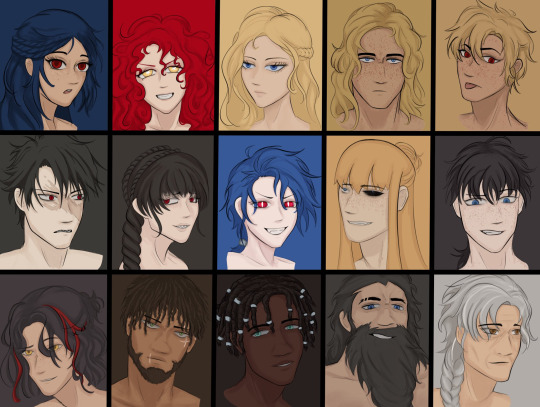
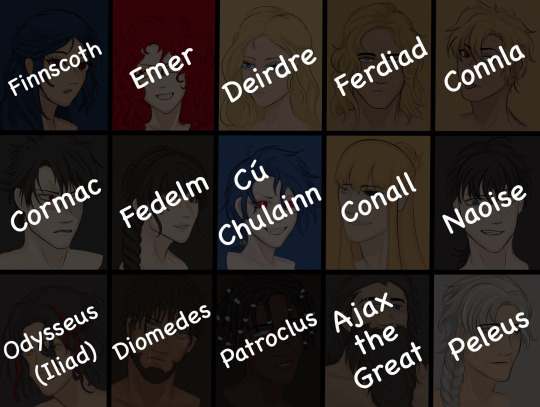
First row: Deirdre, my secondary muses and a rare Finnscoth apparition. Finn and Connla are siblings, so it was fun to try and make them similar to their parents in different ways. Ferdiad is a Fir Domnann, a mythical race that descends from the Fir Bolg, who stayed in Ancient Greece for a few hundreds of years or so. No matter where you are, everyone is always connected. Emer of the Beautiful Hair and Deirdre of the Sorrows were blessed/cursed with the power of divination, so I wanted to better show that with their star & black hole-like pupils.
Second row: Cú Chulainn and his (lore-relevant) cousins. They all come from the same cradle of wolves and, now that I think about it, they really look like they hunt their enemies down with hunting hounds for sport. But who am I to judge others' family traditions. Cormac and Fedelm are half-siblings (from different mothers), children of King Conchobar. Cú Chulainn, Conall and Naoise are the sons of King Conchobar's half-sisters. Their family lore is complicated. And yes, they all have sharp teeth and, yes, they all have canonically murdered people.
Third row: Patroclus and a few men of the Iliad. Odysseus, King of Ithaca, was the great tactician of the Achaean army, even a greater liar, and my babygirl. Diomedes, King of Argos, was one of the greatest Achaean warriors, who even managed to make the goddess of love and god of war bleed. Ody & Dio were always together in the Iliad, participating in raids, schemes, destruction of public property, etc. Do not separate them. Ajax the Greater, second to Achilles in strength and one of the Achaean leaders, got his moniker 'Great' because of his height and size, a man said to be as big as a mountain. Peleus, King of Phthia, was the aged father of Achilles and mentor of Patroclus.
Also, woad paint alt version for the ulster cycle characters under the read more because they feel too naked without any war paint on

#oc art.º#/ i often go for a cuter style but felt necessary to show the similarities between cú & his cousins + his uncanny valley factor as a demigo#/ i know fgo ody has white-grayish hair; but i like to think that his hair used to be dark before the events of the odyssey#/ anyway i finally got this out of my system which means i can go back to writing 😌
8 notes
·
View notes
Text
|| Steven Grant vs. You: I ||
A tiny story where you discover that your sweet, handsome coworker is just as much into Egyptology as you are into ancient Greece- and the playful battle that ensues.
*May become a multi-mini-chapter-moment-thing because it seems more fair for battles to be best of 3 or even 5 than best of 1. Also just a ton of slow burn fluff, which should really be my username at this point cause that’s all I write*
Word Count : Soooo tiny, 1.1k
PART I - PART II - PART III
Tag List
Read this on A03!

“But how can you prefer the ancient Greek world when it was so much more patriarchal?” Steven stammered with a half laugh. He was swinging his croissant around on the other side of the table from you and you couldn’t help but smile as flakes of pastry landed on the table, in his coffee, his lap. “Egyptian women could sue men! They could run businesses and own property and-”
“I’m not saying ancient Greece was better than ancient Egypt!” you assured, laughing. “I just have always been infatuated by the myths. And I don’t know, to me it’s like those Gods were really there, once, you know? These gorgeous, terrifying, giant presences that were all at once infatuated with humanity as they were spiteful. It’s such a different relationship than religious folks have with their deities now. They lived on a mountain that really exists, you could hike up it and speak to them if you wanted. They lived in the depths of the earth, and in the ocean, they were here, you know? Not a heavenly body, but here.” You rested one of your hands on your chest as you said it, impassioned. You thought you caught Steven’s eyes tracing the line of your clavicle, what he could see of it past your shirt, and up your neck, how it met with the curve of your jaw- but no, you quickly corrected your thoughts- this was Steven. He probably wouldn’t have noticed you existed if, weeks ago, he hadn’t overheard you lamenting that ancient Greek history wasn’t as well represented in the gift shop as you would have liked.
The playful argument that had ensued led you to this tradition of a full fledged debate in the employee break room during every lunch break the two of you had together. You had taken to checking the break schedule as soon as you clocked in, your heart always skipping a beat when you realized that it would be a Steven Lunch Day.
It didn’t happen as often as you would have hoped, it seemed like Steven’s manager gave him odd shifts quite often. If a late night was needed, or two, four hour shifts three hours apart, Steven was the one who got them. Since you worked mornings it was always an unexpected treat to see him working.
“You have to admit that that is neat.” you pushed, grinning as Steven set down his crumbled wad of a croissant.
“No!” Steven laughed, “No, no no no…” he ran his fingers through his hair, croissant flakes tangling into his curls. “You get me all wrong- of course ancient Greece is neat.” he conceded, his tone earnest and bright. “It’s beautiful and there is so much to learn about, so much history. I can totally understand why you like it so much-”
“But?” you raised your eyebrows with mock defensiveness.
“No buts!” Steven said a little too loudly. A few of your coworkers glanced over before continuing to do their best to ignore you both for the umpteenth time. You snorted and had to force yourself to take a sip of coffee so you wouldn’t keep laughing. You were sure that you and Steven must have been annoying everyone else with these talks, but you couldn’t help yourself.
Here was this man with a beauty that rivaled silent film actors. A Rudolph Valentino stand-in who also was one of the sweetest people you’d ever met. And he was smart. Your coworkers seemed weary of him for his awkwardness, but you’d take that over how most of the museum’s patrons treated staff.
“But-” Steven said softly, with a playful wince.
“Yes?”
“You have to admit that, as far as intensity in awe… the ancient Egyptians prospered in ways we still can’t replicate or understand. We don’t even know how they accomplished what they have left us behind.”
“That’s true with the Greeks!’ you scoffed, “We still don’t understand how the Hellenic sculptures carved marble that is so delicate and top heavy that still hasn’t crumbled. Even the Romans couldn’t figure it out and just gave all their sculptures thick tree trunks carved beside the sculpture’s legs. And let’s not forget the whole cement with marble veneer thing.”
“Oh, we can’t forget that.” Steven replied wryly, which made your face feel very warm.
“Are you teasing me?” you asked, astounded. You tapped your boot against his under the table.
“No!” Steven said, jumping in his seat. He held both of his hands up and waved them frantically. “No I would never, honestly, it’s just so nice to know someone that likes something as much as I like… well, as much as I like another thing.”
“Until I convert you.” you said, smiling softly.
“Right-” Steven chuckled, his voice broke mid laugh in a way you had come to covet. “That’s not gonna happen though, you know? You know that the whole reason I work here is for Egyptology?”
“I know it is why you came here.” you granted, pushing your feet together so you could resist kicking him again.
“But?” Steven tilted his head, eyes warm.
“No buts!” you mimicked, “But, it might not be the reason you stay?”
“Hey!” he frowned, “But you did but!”
“Okay how about this-” you started, leaning against your side of the table conspiratorially. “Ancient Egypt and Greece were very intertwined, right? We would probably both be very happy if we could just-” you made a sweeping gesture with your hands, Steven’s eyes watched as if fully expecting for something to appear between your fingers. “-be there. Let’s say the Library of Alexandria, for fun’s sake. At least tens of thousands of papyri, Grecian philosophers on Egyptian earth-”
“Grecian dominated Egyptian earth-” Steven mumbled, intrigue shining from his eyes despite himself.
“Macedonian.”
“That’s still Greek!”
“I can’t help that my favorite ancient civilization conquered yours! You guys had a good run!” you teased, popping the last bit of your pastry into your mouth with a satisfied gesture. This awarded you a very flat glare. “I guess history is repeating itself right here and now.”
“Silly.” Steven murmured, “I am not conquered and you have not won me over.”
“Yet.”
He opened his mouth to make another playful retort, but before he could the timer on your phone went off. You pretended to not notice Steven’s shoulders slump downward as you turned off the alarm and stood up.
“Does that alarm mean you’re going?” he asked.
“It means that we are!” you replied, leaning down to wrap your arms around one of his, you pulled him up from his chair. “Last time you forgot to clock back in and I didn’t want you to get in trouble again so I just put a timer on my phone.”
Steven stood still, looking past his shoulder and into your eyes. His expression was calmer, less full of anxiety and enthusiasm. “Thank you-” he said softly.
You gave his arm a last squeeze before he let you pull him out of the break room.
#steven grant#moon knight#steven grant x reader#moon knight x reader#moon knight fan fiction#steven grant x you#steven grant fluff#moon knight imagines#mcu moon knight#non binary#non binary fan fic
189 notes
·
View notes
Photo

I consider myself King of the Hellenes and sole expression of legality in my country until the Greek people freely decide otherwise. I fully expected that the military regime would depose me eventually. They are frightened of the Crown because it is a unifying force among the people.
- King Constantine II of the Hellenes
An important chapter of Greek history ended on 11 January 2023, in Athens, with a deafening silence. The former king Constantine II died at the age of 82 in Athens. Some Greek media outlets referred to him as Constantine Glücksburg, not wishing to mention the royal title of the former monarch who was deposed in 1974.
The last member of the Danish dynasty to rule from 1863 until the return of the Parliamentary Republic was the cousin of the British monarch Charles III and one of the godparents of his son, Prince William, and the brother of Queen Sofia of Spain. But his death caused barely a rustle in Greece, a country that has been riven by divisions between royalists and democrats since its creation.
He was not given the state funeral he had so much desired. Neither the Greek Prime Minister, Kyriakos Mitsotakis, nor the President of the Republic, Katerina Sakellaropoulou, were present at his funeral on 16 January. His death "marks the formal epilogue (...) of a chapter that was definitively closed with the 1974 referendum," when Greeks voted by 70% to abolish the monarchy, said the prime minister in a terse message of condolence. The conservative leader also recalled "the eventful journey of former King Constantine, marked and punctuated by turbulent moments in the contemporary history of Greece." "History now has the floor. It will judge fairly and severely the Constantine of public life," he concluded.

The legacy of King Constantine II of the Hellenes remains a mixed one and mirrors the divided feelings of Greeks have to this day about their last king.
In many ways, Constantine was a victim of the vicious political infighting that had characterised Greek politics and its society for much of the period since the second world war. It perhaps needed a stronger, more experienced and more resolute approach to surmount the crises of his three-year reign than the young man in his early 20s could manage. In later life he said in an interview that he might have liked to be an actor or a journalist, but his fate was to spend his life as an ex-king, harried by Greek politicians and in turn harassing them in a prolonged legal fight for compensation for his family’s lost property, eventually through the European court of human rights.
Born in Athens, Constantine was the son of the Greek crown prince, Paul, the younger brother of King George II, and his German-born wife Princess Frederica, and was taken into exile as a baby following the Italian and then Nazi invasions of the country in 1940-41. His early years were spent first in Egypt and then in South Africa, before the family returned to Greece following the referendum that restored George to the throne in 1946. George died the following year, and Paul became king.
Constantine was educated at a private high school in Athens, modelled on the same lines as the German educationist Kurt Hahn’s principles at Gordonstoun, and afterwards attended Athens University to study law. A keen sailor, Constantine was a member of Greece’s winning sailing team at the 1960 Rome Olympics – the country’s first gold medal in nearly 50 years.
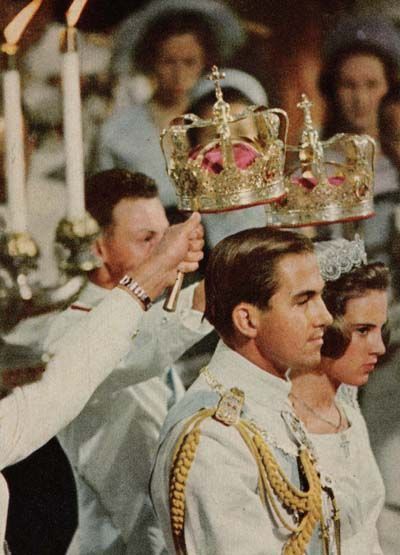
He succeeded to the throne aged 23 on his father’s death in March 1964, becoming head of state in a country that had not got over the civil war between communists and the Greek government of 1946-49, and where political tensions and divisions continued to run deep. The CIA, desperate to avoid Greece falling into communist hands, was also active in Athens. Greece was a strategic pawn between the US and the Soviet Union, each anxious to pull the country into its sphere of influence in the eastern Mediterranean. At the same time, it was attempting to modernise with social and economic reforms as an associate member and applicant to join the Common Market.
The month before Constantine came to the throne, a general election had produced a leftwing government under George Papandreou, following eleven years of rightwing government. Within a year, relations between the king and his prime minister were breaking down. Conservative army officers were alarmed by a perceived leftwards drift among the junior ranks, who were supported by Papandreou’s Harvard-educated son Andreas. When George Papandreou announced that he would take over the defence ministry himself, Constantine refused to allow him to do so, and the government resigned. In the hiatus that followed, the king attempted to appoint a government without holding an election and was accused of acting unconstitutionally.

When elections were finally called in April 1967, the likely re-election of Papandreou was forestalled by an army coup led by colonels. Constantine initially appeared to go along with the insurgents. He argued later that he had had no choice as the palace was surrounded by army tanks, but there were also persistent suggestions that he had been urged by the American embassy to do so in order to avoid another radical government. Many Greeks and civilian politicians never forgave the king for acceding to the coup, but within months he attempted a counter-coup of his own, fleeing to loyalist troops in the northern city of Kavala that December in an attempt to create a rival military support and force the junta to resign.
The operation was poorly organised and, although the air force and navy declared their support, the army and its officers rallied to the coup leaders. Support for the king melted away within 24 hours. Fearing bloodshed if it came to a military confrontation, Constantine and his family fled into exile, first in Rome and then a few years later in London.

There was no going back for the king. The junta, led by Colonel Georgios Papadopoulos, brutally consolidated their regime using censorship, mass arrests of opponents, torture and imprisonments, and were not going to reinstate Constantine after his attempted coup. When monarchist navy officers unsuccessfully attempted to overthrow the colonels in June 1973, Papadopoulos declared the country a republic, endorsed subsequently in a plebiscite widely assumed to have been rigged.
Nonetheless, when the regime fell following the Turkish invasion of Cyprus in 1974, to be succeeded by a civilian government, a further referendum was held to determine whether the king should be restored. Constantine was not allowed to return in order to campaign on his own behalf, though he was allowed to broadcast an address from London in which he apologised for his previous errors. But his maladroit interference with the civilian governments before the coup was held against him and the outcome of the vote in December 1974 was heavily in favour of a republic: by 69% to 31%.

Thereafter, for decades, Constantine was prevented from visiting Greece except briefly and on rare occasions: for his mother’s funeral in 1981 and for an attempted holiday in 1993, when he found his yacht was constantly harried by torpedo boats and aeroplanes. The following year, the Greek government revoked his citizenship and passport and seized the royal family’s property. “The law basically said that I had to go out and acquire a name. The problem is that my family originates from Denmark and the Danish royal family haven’t got a surname,” he said, adding that Glücksburg was the name of a place not a family: “I might as well call myself Mr Kensington.”
In 2000, the court of human rights found for the king in relation to the property, though it could only order compensation, not the return of his extensive estates nor the royal palace at Tatoi and awarded him only 12m euros (around £10m), rather than the 500m he had asked for: a reduction that the Greek government counted as a triumphant vindication. It nevertheless took another two years to pay the money and, when it did so, the government took it from its extraordinary natural disasters fund rather than general reserves. In retaliation, Constantine used the money to set up a charitable foundation in the name of his wife to assist Greeks suffering from natural disasters. He said: “I feel the Greek government have acted unjustly and vindictively. They treat me sometimes as if I am their enemy – I am not the enemy. I consider it the greatest insult in the world for a Greek to be told he is not a Greek.”

Generally, while expressing a wish to be allowed to live in Greece, which was granted in 2013, Constantine seemed equable about his fate and did not attempt to regain the throne. “All I want is to have my home back and to be able to travel in and out of Greece like every other Greek. I don’t have to be in Greece as head of state. I am quite happy to be there as a private citizen,” he told the news media in 2000. “Forget the past, we are a republic now. Let’s get on with the future.”
By the standards of the hapless Greek monarchy, Constantine II, the last king of the Hellenes, who died aged 82 on 10 January 2023, led a comfortable life in exile after a brief and turbulent reign. Of the seven Greek monarchs of the 19th and 20th centuries, three were deposed, one assassinated, two abdicated and one died of septicaemia after being bitten by a barbary ape in the royal gardens.
The Glücksburg monarchy was German-Danish in origin, imposed on Greece in the 1830s. During prolonged wrangling after Constantine’s deposition, the Greek government refused to give him a passport until he acknowledged that he was Mr Glücksburg, whereas he insisted he was just plain Constantine. As the last of Greece’s deposed monarchs he escaped lightly. But decades of exile in London, as one thing the Greeks did not want back from Britain, were not how he would have chosen to spend his life. For more than 20 years he was careful not to stir up anti-monarchist feeling in Greece, though he never relinquished his claim to the throne.

But Greeks have long memories. When the Greek colonels seized power in 1967, instigating seven years of tyranny, it was King Constantine who tried to stand up to them and rally the forces of democracy; but he did so rather naively and feebly.
Had Constantine succeeded, as did his brother-in-law Juan Carlos of Spain, he might have been a hero to his people. As it was, in the eyes of many Greeks, he remained tainted by family history and by his own clumsy mishandling of the political crisis that had brought about his exile. It’s a mistake he has freely acknowledged during the long 46 years of exile from his homeland.
There are Greeks still today who have always felt the referendum to depose him as King was rigged. For his part, Constantine, always continued to support democracy and the republic. Except with one caveat. According to many, Constantine never accepted his deposition. His Danish diplomatic passport still read "Constantine, King of Greece." In an interview with the television channel Skai in 2016, he even said: "I am not the former King Constantine, I am King Constantine, period."
In public at least, his fidelity to the republic bore fruit when he was allowed to come back to Greece and reside there. By all accounts his return from exile was a happy one where his home in Peloponnese coast gave him the peace he so long craved to live and eventually die in his own homeland. "All Greeks who live in exile want to return. It's in their blood," And so he got his wish. He was buried as a Greek, if not as a king.
RIP King Constantine II of the Hellenes (1940-2023)
#king constantine II of the hellenes#constantine II#greece#quote#royalty#monarchy#history#politics#coup#exile#king constantine II of greece
45 notes
·
View notes
Text
Deep dives into folklore: Unicorns

The unicorn, a mythical creature of grace and beauty, has captured the human imagination for centuries. Its history is rich and varied, evolving through a tapestry of cultures, beliefs, and narratives. From its early appearances in ancient texts to its modern symbolism in popular culture, the unicorn has been a symbol of purity, grace, and mystery. This week we explore the fascinating evolution of the unicorn in literature and mythology, tracing its origins, transformations, and enduring appeal.
The unicorn's origins can be traced back to the ancient civilizations of Mesopotamia and the Indus Valley, where seals and artifacts dating as far back as 2600 BC depict single-horned animals. These early representations might have been inspired by the oryx or the Indian rhinoceros, both of which are known to have single horns. The idea of a single-horned creature gradually permeated the mythologies of various cultures.
In ancient Greece and Rome, the unicorn began to take on more mystical attributes. It was mentioned in the writings of Herodotus, Ctesias, and Pliny the Elder, each contributing to the unicorn's lore. The Greeks believed that the unicorn was a symbol of purity and healing, while the Romans associated it with virtue and virginity. The unicorn's portrayal as a noble, elusive creature was cemented during this period.
The unicorn truly blossomed as a literary and mythological figure during the Middle Ages in Europe. It became a potent symbol of purity and spirituality, often associated with the Virgin Mary. The unicorn's symbolism in medieval Christianity was most famously depicted in the "Hunt of the Unicorn" tapestries, where it was seen as an allegory of Christ's passion and resurrection. Its horn was believed to possess miraculous healing properties.
The unicorn also appeared in various medieval bestiaries, compendiums of mythical creatures, each with its own symbolic meaning. These texts emphasized the idea that only a virgin could capture a unicorn, reinforcing the creature's association with purity and innocence.
During the Renaissance and Enlightenment periods, the unicorn's image shifted slightly. It was still seen as a symbol of purity but also began to represent the pursuit of the unattainable or the idea of an elusive truth. In literature, such as Edmund Spenser's "The Faerie Queene," the unicorn often appeared as a powerful and enigmatic creature.
The Enlightenment, with its emphasis on reason and science, saw a decline in belief in mythical creatures, and the unicorn's presence in literature became less prominent. However, it didn't fade entirely from the human imagination.
In the 20th and 21st centuries, the unicorn experienced a resurgence in popular culture. It became a symbol of hope, magic, and uniqueness. Children's stories, cartoons, and fantasy literature introduced new interpretations of the unicorn. Today, unicorns are often portrayed as playful and colorful creatures, far removed from their more solemn and mysterious medieval counterparts.
However, in a somewhat unpredictable turn of events the unicorn has managed to transcend even its own concept, something that we have yet to witness with any other mystical creature. The unicorn is no longer just a fictional creature but an aesthetic. You won't hear of a 'dragon frappuccino' and you certainly will not find a creature with as much widespread popularity among the general public concious.
Moreover, the unicorn has made a significant comeback in the LGBTQ+ community, with the rainbow-colored unicorn serving as a symbol of diversity and inclusivity. This modern reinvention demonstrates how the unicorn has adapted to represent contemporary social values.
The unicorn's evolution in literature and mythology is a fascinating journey through time and culture. From its humble beginnings in ancient civilizations to its enduring symbolism of purity, the unicorn has adapted to reflect the values and beliefs of the societies in which it appeared. It has morphed from a mystical and spiritual being to a modern symbol of hope and diversity. The unicorn's enduring presence in our stories and imagination attests to its timeless allure and its ability to adapt to the changing needs and values of humanity. Whether as a symbol of faith, purity, or whimsy, the unicorn remains an enduring and enchanting figure in the tapestry of human creativity and mythology.
Taglist (reply or reblog to be added):
@axl-ul @crow-flower @thoughts-fromthevoid @alderwoodbooks @harleyacoincidence @tuberosumtater @sonic-spade @theonlygardenia @holymzogynybatman @nulliel-tres
#writeblr#writers of tumblr#writing#bookish#booklr#fantasy books#creative writing#book blog#ya fantasy books#ya books#deep dives into folklore#folklore#literature#unicorns
8 notes
·
View notes
Photo

By the standards of the hapless Greek monarchy, Constantine II, the last king of the Hellenes, who has died aged 82, led a comfortable life in exile after a brief and turbulent reign. Of the seven Greek monarchs of the 19th and 20th centuries, three were deposed, one assassinated, two abdicated and one died of septicaemia after being bitten by a barbary ape in the royal gardens.
The Glücksburg monarchy was German-Danish in origin, imposed on Greece in the 1830s. During prolonged wrangling after Constantine’s deposition, the Greek government refused to give him a passport until he acknowledged that he was Mr Glücksburg, whereas he insisted he was just plain Constantine. As the last of Greece’s deposed monarchs he escaped lightly. But decades of exile in London, as one thing the Greeks did not want back from Britain, were not how he would have chosen to spend his life.
In Hampstead Garden Suburb, Constantine lived in some state – apparently supported largely by donations from Greek monarchists – and visitors were expected to address him as Your Majesty. He was included in many invitations by the British royal family, to whom, like most of Europe’s monarchies, he was related. Prince Philip was his father’s first cousin, King Charles III his second cousin and Queen Elizabeth II a third cousin, and he was a godfather to Prince William. His wife was a Danish princess, the sister of Denmark’s Queen Margrethe II, and his sister Sofía became queen of Spain. Only in Greece was he unrecognised, and he was not allowed to return to live there until 2013, long after the events that had toppled him from the throne after a military coup in 1967 and resulted in the abolition of the monarchy in Greece in 1973.
In many ways, Constantine was a victim of the vicious political infighting that has characterised Greek politics and its society for much of the period since the second world war. It perhaps needed a stronger, more experienced and more resolute approach to surmount the crises of his three-year reign than the young man in his early 20s could manage. In later life he said in an interview that he might have liked to be an actor or a journalist, but his fate was to spend his life as an ex-king, harried by Greek politicians and in turn harassing them in a prolonged legal fight for compensation for his family’s lost property, eventually through the European court of human rights.
Born in Athens, Constantine was the son of the Greek crown prince, Paul, the younger brother of King George II, and his German-born wife Princess Frederica, and was taken into exile as a baby following the Italian and then Nazi invasions of the country in 1940-41. His early years were spent first in Egypt and then in South Africa, before the family returned to Greece following the referendum that restored George to the throne in 1946. George died the following year, and Paul became king.
Constantine was educated at a private high school in Athens, modelled on the same lines as the German educationist Kurt Hahn’s principles at Gordonstoun, and afterwards attended Athens University to study law. A keen sailor, Constantine was a member of Greece’s winning sailing team at the 1960 Rome Olympics – the country’s first gold medal in nearly 50 years.
He succeeded to the throne aged 23 on his father’s death in March 1964, becoming head of state in a country that had not got over the civil war between communists and the Greek government of 1946-49, and where political tensions and divisions continued to run deep. The CIA, desperate to avoid Greece falling into communist hands, was also active in Athens. Greece was a strategic pawn between the US and the Soviet Union, each anxious to pull the country into its sphere of influence in the eastern Mediterranean. At the same time, it was attempting to modernise with social and economic reforms as an associate member and applicant to join the Common Market.
The month before Constantine came to the throne, a general election had produced a centrist – moderate, leftwing – government under George Papandreou, following 11 years of rightwing government. Within a year, relations between the king and his prime minister were breaking down. Conservative army officers were alarmed by a perceived leftwards drift among the junior ranks, who were supported by Papandreou’s Harvard-educated son Andreas. When George Papandreou announced that he would take over the defence ministry himself, Constantine refused to allow him to do so, and the government resigned. In the hiatus that followed, the king attempted to appoint a government without holding an election and was accused of acting unconstitutionally.
When elections were finally called in April 1967, the likely re-election of Papandreou was forestalled by an army coup led by colonels. Constantine initially appeared to go along with the insurgents. He argued later that he had had no choice as the palace was surrounded by army tanks, but there were also persistent suggestions that he had been urged by the American embassy to do so in order to avoid another radical government. Many Greeks and civilian politicians never forgave the king for acceding to the coup, but within months he attempted a counter-coup of his own, fleeing to loyalist troops in the northern city of Kavala that December in an attempt to create a rival military support and force the junta to resign.
The operation was poorly organised and, although the air force and navy declared their support, the army and its officers rallied to the coup leaders. Support for the king melted away within 24 hours. Fearing bloodshed if it came to a military confrontation, Constantine and his family fled into exile, first in Rome and then a few years later in London.
There was no going back for the king. The junta, led by Colonel Georgios Papadopoulos, brutally consolidated their regime using censorship, mass arrests of opponents, torture and imprisonments, and were not going to reinstate Constantine after his attempted coup. When monarchist navy officers unsuccessfully attempted to overthrow the colonels in June 1973, Papadopoulos declared the country a republic, endorsed subsequently in a plebiscite widely assumed to have been rigged.
Nonetheless, when the regime fell following the Turkish invasion of Cyprus in 1974, to be succeeded by a civilian government, a further referendum was held to determine whether the king should be restored. Constantine was not allowed to return in order to campaign on his own behalf, though he was allowed to broadcast an address from London in which he apologised for his previous errors. But his maladroit interference with the civilian governments before the coup was held against him and the outcome of the vote in December 1974 was heavily in favour of a republic: by 69% to 31%.
Thereafter, for decades, Constantine was prevented from visiting Greece except briefly and on rare occasions: for his mother’s funeral in 1981 and for an attempted holiday in 1993, when he found his yacht was constantly harried by torpedo boats and aeroplanes. The following year, the Greek government revoked his citizenship and passport and seized the royal family’s property. “The law basically said that I had to go out and acquire a name. The problem is that my family originates from Denmark and the Danish royal family haven’t got a surname,” he said, adding that Glücksburg was the name of a place not a family: “I might as well call myself Mr Kensington.”
In 2000, the court of human rights found for the king in relation to the property, though it could only order compensation, not the return of his extensive estates nor the royal palace at Tatoi and awarded him only 12m euros (around £10m), rather than the 500m he had asked for: a reduction that the Greek government counted as a triumphant vindication. It nevertheless took another two years to pay the money and, when it did so, the government took it from its extraordinary natural disasters fund rather than general reserves. In retaliation, Constantine used the money to set up a charitable foundation in the name of his wife to assist Greeks suffering from natural disasters. He said: “I feel the Greek government have acted unjustly and vindictively. They treat me sometimes as if I am their enemy – I am not the enemy. I consider it the greatest insult in the world for a Greek to be told he is not a Greek.”
Generally, while expressing a wish to be allowed to live in Greece, which was granted in 2013, Constantine seemed equable about his fate and did not attempt to regain the throne. “All I want is to have my home back and to be able to travel in and out of Greece like every other Greek. I don’t have to be in Greece as head of state. I am quite happy to be there as a private citizen,” he told the Sunday Telegraph in 2000. “Forget the past, we are a republic now. Let’s get on with the future.”
Constantine is survived by his wife, Princess Anne-Marie of Denmark, whom he married in 1964; and their three sons, Pavlos, Philippos and Nikolaos, and two daughters, Alexia and Theodora.
🔔 Constantine II, former King of Greece, born 2 June 1940; died 10 January 2023
Daily inspiration. Discover more photos at http://justforbooks.tumblr.com
44 notes
·
View notes
Text









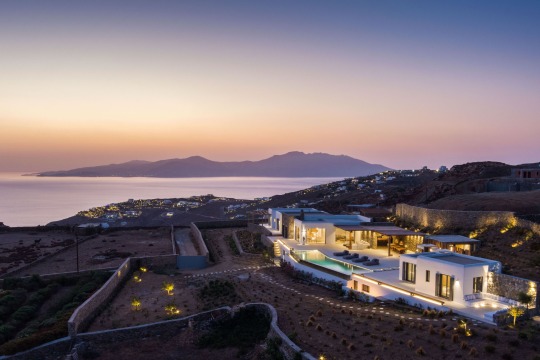
Buy or Rent a Villa in Greece 🇬🇷
Greece has become one of the most popular travel destinations in the South of Europe for many reasons (see my previous post) and with an increase in governmental stability, beneficial corporate tax, the Golden Visa Program, affordable pricing & great rental income, Greece has seen an increase in foreign buyers as well.
Here’s more info on buying & renting a Villa on the best Islands Greek islands 🏝️
BUY
Villas start at €1-2m, Premium Villas start at €5/6m.
• As a foreigner expect to pay cash.
• You pay 10% down at signing, 10% in 2-3 weeks upon completing the survey and balance at close.
• Closing costs are for the buyer which are about 8/9% of the purchase price (includes tax, notary, lawyer, commission).
• The Golden Visa 🇪🇺 this is why many people buy in Greece. If you buy a property over €250k, you can qualify for this visa (you can be a joint owner of the property as well). This gives you a 5 year Greek residency, and you can travel unconditionally to any European country (Schengen) for 90 days per stay per 6 months. Renewable after 5 years.
• There are no rental restrictions. Rental tax is 22% on your profits if rented by a management company or 45% on your income above €45k if rented individually.
• Costs: property tax is about €1-2k per year up to €3k for a premium Villa. Utility fees €6-7k a year and insurance around €2k
• High season in Greece is from April until October (peak June-August).
————————
RENT
• Price🏡💰
=> Our villas start at €10k/w (3-5 bedrooms) with an average of €35k/w. The Premium Villas range from €60k up to €175k/w (8-12 bedrooms) usually with full service included 🛎️
• Most villas have a 7 days minimum and 30-50% deposit.
• Book in advance 📅 (6 months preferred) as occupancy is extremely high during summer.
————————
If you you’re planing on buying or renting a Villa in Greece let me know 🏡 I partnered up with my Sotheby’s colleagues in Greece and happy to assist you here! 🙌🇬🇷
#greece #greeceislands #greekvillas #greecerealestate #mykonos #santorini #paros #antiparos #mykonosvillas #sothebys #sothebysrealty
#greece#Greece real estate#Greece villas#villas Greece#real estate Greece#sothebysrealty#sothebys#mykonos#mykonos villas#santorini#Santorini villas#international real estate#rent in Greece#buy in Greece#Greece villas for sale#Greece Villa rental
2 notes
·
View notes
Text
Dwellchip...SSSG.
Dwellchip...SSSG.
Dwell chip A Non profit everyone one profits foundation bound upon property collection and property management properties are not for Distribution extribution exchange or private Dwellingspace all properties belong to Dwellchip and are group dwelling space and or Social Support Group meeting be it only takes two too meet and encourage moral ethical conduct and be A coach and or support , Dwellchip is self sustainable Corporation institution our mission is to purchase and or legally Acquistion Real estate with goal of Supporting the AA and SSSG program through gathering and sharing or Confession and Closer contact with God King of Greece no matter the time period A Dog Breeder companion company profit margin secured credit debit insurance and self funding all our concerns secondary primary operations Non profit pet dog prescription and advising Bigger Dwellingspaces and Resorts or Hotels are considerably encouraging and generation of income by property banking equity and property value by Legal Tender debt equivalent our Funds insured and invested in contribution form Our mission to venture and field it more scout and acquire property that SSSG as A whole have primary administration and active status until one may decide to release the property to A preferred member of SSSG and every Social Support Group member our vision to become A lasting foundation founded within the walls of the Chip house of Sovereignty Huojinsi before Friday secured by Monday Moonday Sunday or Sonday Suun and Tsunday our mission will be greatly more famous with A name and the inability to spell it make it famous and people celibate celebrities our value be in God's purist will and follow A code of discipline conduct morality and ethics with Kingdom Banking Rates and Interest rates and or return rates revenue income rates with interested Networks and Networking Welcome to ChipDwell....A Non profit everyone profit Private Stock and future property index Founder Terry i
2 notes
·
View notes
Text
The Madrid System for International Registration of Marks
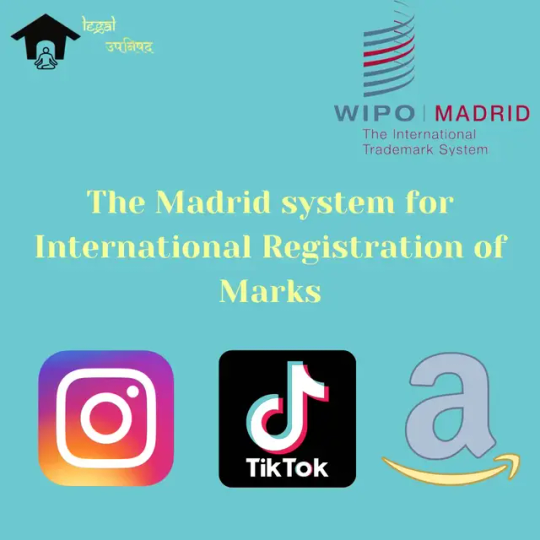
This article on 'The Madrid system for International Registration of Marks' was written by Monika Yadav an intern at Legal Upanishad.
Introduction
In this article, we will know about the Madrid system of trademarks. The Madrid System seems to be a practical and economical way to register and maintain trademarks globally. To file for safety in as many as 128 nations, just submit one application as well as pay a single amount of fee. Utilize a single, centralised system to update, refresh, or increase your global trademark inventory. We will understand the Madrid protocol and also the Madrid agreement. India is also a member, and we see the workings of the system and then conclude our article.
What does it mean?
Two separate treaties, the Madrid Agreement and the Madrid Protocol oversee the registration of trademarks in various jurisdictions worldwide. Although it bears the name "Protocol," it is not a "protocol" to the Agreement but rather a separate agreement. The Madrid System for the International Registration of Marks is what the Agreement and the Protocol are collectively referred to as the Madrid System.
The term "Contracting Parties" refers to all States and organisations that are parties to the Protocol and/or the Agreement. They collectively make up the Madrid Union, which is a Special Union following Article 19 within the Paris Convention. The Madrid System is a method for acquiring a collection of trademark registrations in numerous states that are professionally managed by the International Bureau of the World Intellectual Property Organization (WIPO), effectively establishing a foundation for an "international registration" of marks.
The Madrid Agreement
To enable the need to file, seek, or maintain separate registrations in many countries is eliminated by a single, affordable worldwide trademark registration. The Agreement was established in 1891. Whenever a mark is registered as per the Agreement, having the exact legal impact as if the mark owner had decided to register it in one of the member countries. If the targeted country's trademark office neglects to notify WIPO of a denial of registration within the allotted 12-month period, the trademark will be protected to the same extent as authorized national trademarks in the same nation (but as per Protocol it extends to 18 months).
The Agreement calls for a simplified renewal procedure because WIPO only needs one file for both renewals as well as modifications to the primary registration which impact all of the nations included here by registration.
Regardless of the benefits of registration under the Agreement, the US and other important nations (including Australia, Denmark, Finland, Greece, Iceland, Ireland, Japan, Netherlands, Republic of Korea, Sweden, and the United Kingdom) had not ratified it because of purported structural issues. These so-called flaws allegedly included things like the requirement for home country registration even before the granting of mark safety, infinite limitations on assignability, a chance of a "central attack" on the mark, a brief inquiry time, evaluation costs that were less expensive than those currently charged by the native nation's mark offices.
The Madrid Protocol
To address such alleged flaws within the Agreement, the Protocol was approved in 1989. However, the Protocol upholds the Agreement's original goal, which was to establish a mechanism for quick and affordable worldwide trademark registration. As a result, although there are currently only 57 signatories to the agreement, 74 nations, including the USA, were part of either the Agreement or the Protocol.
India as a member
A trademark holder might also use their Community Trademark (CTM) to preserve their mark through 88 Contracting Parties and the EU under the Madrid system, which is administered by WIPO, by filing a specific application in one of three languages (English, French, or Spanish), in addition to a limited piece of fees in a single currency (Swiss Francs). India adopted the Madrid Protocol on April 8, 2013, and it joined on July 8, 2013, increasing the overall number of parties to 90.
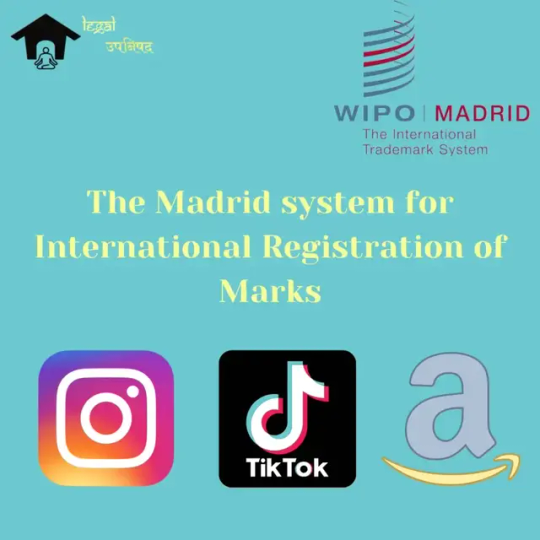
The Madrid system for International Registration of Marks
The Working
With the help of the Madrid System's "Basic Application / Registration" method, a trademark owner who has filed for registration or already has a registration in a member country may receive "International Registration" for their brand from WIPO. After that, the mark's owner has the option of choosing "International Registration," also known as "Designation," to get protection in one or more member nations.
Furthermore, thanks to the Madrid Protocol, a trademark owner can now simultaneously apply for registration across any partner jurisdiction and receive "International Registration" by force of the Madrid Protocol. By submitting a single application in a single jurisdiction with a limited fee, a trademark owner can register their mark for any or even all member states, make any necessary changes to the information (such as their name or address), and renew their registration in all relevant jurisdictions across a single official bureaucratic system.
The natural reversal of the previously stated Madrid System/Protocol feature is, nevertheless, that if a "Basic Registration/Application" is rejected, cancelled, or revoked, the global registration will likewise be rejected, cancelled, or rescinded to the same level. For illustration, if the "Basic Application" for shampoo is cancelled, the "International Registration" of the exact mark for shampoo is going to be cancelled. This applies to applications for registration of marks for herbal products such as cleansers, face washes, and hair products. The "International Registration" will also be rejected if the "Basic Application" is rejected.
The process of testing a "Basic Application" for registerability is known as a "Central Attack." An "International Registration" (also known as a "Transformation") is split up into several applications in every jurisdiction to reduce the impacts of a successful central attack. This overpriced process is justified, however, in addition to this benefit but also because the applications that arise will use the registration date of the global registration as their date of filing.
Conclusion
The Madrid Express database would be a free tool offered by WIPO to look up international marks. It is modified every day. The database includes interfaces for both basic and structured searches. All global registrations which are active at the moment or have recently been terminated are included in Madrid Express.
WIPO makes all efforts to guarantee about the database accurately portrays the information contained in the Global Registration, but users should be aware that the Gazette is still the only authoritative source and that the only reports issued by the International Bureau about the components of the Global Registration for a specific world registration are the approved substances by the Register recognised upon recommendation.
References
- Vicenc Feliu, International Trademark Law- The Madrid System, Available at: https://www.nyulawglobal.org/globalex/International_Trademark_Law.html (Accessed: November 29, 2022).
- Sharad Saini, The Madrid System for the International Registration of Marks, Available at: https://www.khuranaandkhurana.com/2013/07/16/the-madrid-system-for-the-international-registration-of-marks-madrid-system/?amp=1 (Accessed: November 29, 2022).
- Madrid- The International Trademark System, Available at: https://www.wipo.int/madrid/en/. (Accessed: November 29, 2022).
Read the full article
2 notes
·
View notes
Text
#sell property in greece#selling property in greece#property selling#real estate property in greece#property management greece#greece real estate
0 notes
Text
@mythosisms | Ancient Greece AU [Ulysses/Elysia]

Vasilios never wanted to be a soldier or a merchant like his siblings, because they brought them far from their family. He was raised simply, a middle class family in an island off mainland Greece. Rather he wanted to study policies and work in the government and stay in the same town, for the most part. This decision made him the town’s main contract-maker, where everyone would flock to him if they wanted to start a business, wanting to purchase property, or even gain an understanding in legal matters that are not known well to a town with a low literacy rate. Now all of this was starting to feel beneath Vasilios and he thought he should aim higher and become a politician. For that, he might have to venture to Athens after all, which he thought was the only downside but he had his mind made up.

It was his first boating trip, thankfully not alone but managing to join a fisherman’s boat that was heading in the same direction. The movements of the boat along with the salty stench was making his stomach turn, and the sun blaring over them made him feel utterly uncomfortable. He told himself that he needed to bear it just a few more hours. To soothe himself, he went inside the ship’s cabins to rest. Hopefully there was no storm, or any crashes because he was sure he was going to drown. Vasilios never learned to swim, and that was probably for the better. His parents did not allow him to venture too far into the oceans, like they would allow their siblings and he always wondered why that was. But maybe it was because he somehow established that he didn’t like it, back when he was a child? Just like how he was sure he did not enjoy the deep waters now that he was suffering from sea-induced nausea?
He landed in an island of Crete, where the fishermen would be staying for some time before returning on their destination. Vasilios knew that they would have to sell, make profit, gain bait, food and equipment before returning so it might take some time. So he went to a tavern and decided to stay the night somewhere where he can flatten his back in a still place.
The Hero Games. That’s what everyone was talking about and he couldn’t even stop himself from overhearing. That is why the next morning, after he got rest, he decided to see what in Hades is the Hero Games even about? He bought his ticket and sat down in a middle seat, and noticed the lineup. One after another the heroes were battling one another, and only the winners were allowed to advance. He kept his eye on one specific one, a familiar woman he might have seen at the tavern?
3 notes
·
View notes
Text
Pci encryption-decryption controller driver windows 8 download

EOF.
Chipset Driver for Windows 8 (32-bit, 64-bit) - Lenovo Flex.
How to Fix PCI Encryption/Decryption Controller Issue.
Asus pci encryption decryption controller - sanycrafts.
How to Fix Encryption/Decryption Controller Issues on Win11/10.
PCI Encryption/Decryption Controller - missing driver.
PCI Encryption/Decryption Controller Driver Issues (Fixed).
PCI Encryption/Decryption controller missing - AMD Community.
Driver Pci Encryption/Decryption Controller Acer | Latest.
Windows 10 Drivers for PCI Encryption/Decryption Controller.
Pci encryption-decryption controller driver lenovo.
Encryption and Decryption - Free download and software.
Pci encryptiondecryption controller driver windows 8 download.
How to Download ASUS PCI Device Driver (2 Ways) - Mos Tech Tips.
EOF.
#Pci encryption decryption controller driver windows 8.1 asus for free; #Pci encryption decryption controller driver windows 8.1 asus for free. Drivers are the property and the responsibility of their respective manufacturers, and may also be available for free directly from manufacturers' websites. The ™ agent utility uses data collection. Except, Windows could not find the appropriate driver for the PCI Encrytpion/Decryption Controller. Windows could not find the driver for it, and I am asking if there is a driver to download for it. The exact quote in Device Manager is " The drivers for this device are not installed. (Code 28) There are no compatible drivers for this device.
Chipset Driver for Windows 8 (32-bit, 64-bit) - Lenovo Flex.
Drivers Library. To find the latest driver for your computer we recommend running our Free Driver Scan. PCI Encryption/Decryption Controller - Driver Download. * Vendor: * Product: PCI Encryption/Decryption Controller. * Hardware Class: DiskDrive.
How to Fix PCI Encryption/Decryption Controller Issue.
Nov 16, 2021 · A PCI controller is built into the motherboard and provides an interface between the PCI bus and the user interface. The PCI core interface is independent of the processor and allows for an efficient transition between processor generations and makes it easier to use multiple processors. PCI stands for “Peripheral Component Interconnect.”. Apr 07, 2022 · Following steps are for your reference. 1) Go to ASUS’s official website. 2) Click the Support menu then select Drivers & Manuals. 3) Enter your ASUS laptop/desktop model name in the “Please enter a model name” box, then select the model name from the dropping list. 4) Click on Driver & Tools on the right. Pci Encryption/decryption Controller Driver Windows 10 Download IdeaPad 320 - Missing PCI encryption/decryption and SMBus controller drivers. 2021-03-06, 12:28 PM. Hello, After installing Windows 10 on my Lenovo IdeaPad 320, I went to Lenovo website to update Bios and all drivers. Installs the Intel® Trusted Execution Engine (Intel® TXE) driver and firmware for Windows®.
Asus pci encryption decryption controller - sanycrafts.
To automatically update the drivers of the PCI Encryption/Decryption Controller, perform the following steps: Open Device Manager. Locate ‘ PCI Encryption/Decryption Controller ’ under “ Other Devices.” Right-click on it and click on ‘ Update Driver.’ The computer would start an online search to locate and install the appropriate drivers. Sep 02, 2020 · Dell Pci Encryption Decryption Controller Windows 8 For The; I purchased á usb 3.0 display adaptor, to vga, and it does not work on the 3.0 port. My monitor is a Samsung 213T which its native is 1600x1200 and my usb adaptor supports that resolution also. Samsung does nót have 64bit drivers for this monitor, which I think is irrelivent anyways. Anguilla Antigua and Barbuda Argentina Aruba Australia Austria Bahamas Bangladesh Barbados Belarus Belgium Bermuda Bolivia Brazil Bulgaria Canada Cayman Islands Chile China Colombia Costa Rica Croatia Curaçao Cyprus Czech Republic Denmark Dominican Republic Ecuador Egypt El Salvador Estonia Finland France Germany Greece Grenada Guatemala.
How to Fix Encryption/Decryption Controller Issues on Win11/10.
Cannot find PCI Encryption/Decryption Controller Driver. Pci encryption/decryption controller missing Windows 10 pro x64. Laptops and netbooks: lenovo g series laptops: g70 35. Intel Chipset Driver for Windows 8.1 (64-bit), Windows 10 (64. Pci Encryption/decryption Controller Driver Lenovo G50-45. PCI Encryption/Decryption Controller Driver. #Pci encryptiondecryption controller driver windows 8 download how to. How to fix unknown pci device in windows device manager. #Pci encryptiondecryption controller driver windows 8 download update. 10 update and chose not to keep any personal settings/files and it feels like a fresh upgrade. The main difference between industrial and unknown.
PCI Encryption/Decryption Controller - missing driver.
Jan 15, 2008 · Download Encryption and Decryption for Windows to encrypt and decrypt e-mail messages. If your laptop drivers for Windows drivers download. ASUS is a leading company driven by innovation and commitment to quality for products that include notebooks, netbooks, motherboards, graphics cards, displays, desktop PCs, servers, wireless solutions, mobile phones and networking devices. Driver asus x200m i obtained from official asus website. Sep 28, 2017 · Pci encryption/decryption controller acer windows 8.1. PCI Encryption/Decryption Controller Driver for Acer - Aspire E1-410G working on Microsoft Windows 8 Enterprise. Supported OS: Windows 10 32 & 64bit, Windows 8.1 32 & 64bit, Windows 7 32 & 64bit,. Download the latest drivers for your Acer Aspire E1-410G to keep your.
PCI Encryption/Decryption Controller Driver Issues (Fixed).
Oct 17, 2019 · pci encryption/decryption controller X570 Driver. I have a fresh install of windows 10 all updated, have gone to the Asus website downloaded and installed all drivers/updates. I have installed AMD drivers/chipset package also. In device manager its still showing as 2 drivers missing. 1. pci encryption/decryption controller.
PCI Encryption/Decryption controller missing - AMD Community.
Jan 08, 2018 · Download and unzip the file to its folder. Do not do anything with the files in the folder. Go to the device manager and click on the PCI E/D Controller needing the driver. Click on the driver tab. Click on Update Driver. Select the Browse my computer for driver software option, and browse to the driver folder you unzipped.
Driver Pci Encryption/Decryption Controller Acer | Latest.
An easy fashion to update the PCI encryption/decryption controller commuter is using the Windows Device Manager. Here are the steps: 1) Type device manager in the search box and click Device Manager.
Windows 10 Drivers for PCI Encryption/Decryption Controller.
Dec 15, 2021 · 1) Type device manager in the search box and click Device Manager. 2) Double-click Other devices (or Unknown devices) to expand the list. 3) Right-click PCI Encryption/Decryption Controller, and click Update driver. 4) Click Search automatically for updated driver software. Windows will directly download and install the detected new updates. Missing PCI Encryption/Decryption Driver - PCI\VEN... - Page.Solved: DN2820FYKH Windows 8.1 64bit driver missing: PCI.Pci encryption/decryption controller driver windows 10 sm bus. *Warning (for adventurous eaters only)... in the Other Devices group in the Windows device manager.... Download Center. 0 Kudos Copy link. Share. Reply. CLin79.
Pci encryption-decryption controller driver lenovo.
Pci encryptiondecryption controller driver windows 8 download drivers# To fix your Drivers problems you will need to know the particular model of the Lenovo device you are having problems with. ARE ALL GEFORCE THE SAME WINDOWS 7 64BIT DRIVER. & Support Assistant gives no necessary device/driver updates/downloads. Go to the device manager and click on the PCI E/D Controller needing the driver. Click on the driver tab. Click on Update Driver. Select the Browse my computer for driver software option and browse to the driver folder that was created when you ran the file. That folder will be located in C:\SWSetup\sp69116. Make sure the include subfolders box.
Encryption and Decryption - Free download and software.
Jul 08, 2022 · May 03, 2022 Pci Encryption/decryption Controller Driver Windows 10 Download IdeaPad 320 - Missing PCI encryption/decryption and SMBus controller drivers. 2021-03-06, 12:28 PM. Hello, After installing Windows 10 on my Lenovo IdeaPad 320, I went to Lenovo website to update Bios and all drivers.
Pci encryptiondecryption controller driver windows 8 download.
Jun 12, 2022 Pci encryption-decryption controller driver windows 8. Below are the steps to download SM Bus controller driver for Windows 7 64 bit or higher versions. Step 1: Firstly, download and install Bit Driver Updater on your PC. Drivers for PCI Encryption/Decryption Controller - Microsoft. How to Fix PCI Encryption/Decryption Controller.
How to Download ASUS PCI Device Driver (2 Ways) - Mos Tech Tips.
PCI encryption/decryption controller shows exclamation mark. My machine is Dell Inspiron 15 3541. I installed the following chipset driver but the device manager is still showing "PCI encryption/decryption controller" exclamation mark: Chipset_Driver_12GYH_WN_6.2.9600.3905_A00.EXE. Hardware ID. Why Choose Us - Driver Easy. PCI Encryption/Decryption controller missing - AMD Community. Toshiba | Consumer Product Support. Download Wireless Network Driver for the Dell - CCM. Driver name: Realtek LAN Adapter DriverFile name: OS: Windows 7 (32-bit, 64-bit)Version: 7.50.1123.2011 Manufacturer:Realtek. May 20, 2022 · Fix PCI Modem Drivers Problems – troubleshoot problems with PCI Modem >> PCI Driver Errors in XP. The most common PCI Driver Downloads are for PCI Drivers for Windows 7, PCI Audio Drivers, PCI Network Drivers and PCI Card Drivers. Start Download. PCI Simple Communications Controller driver. Quvonchbek. Member. Posts: 4 New User. June 2020 in.
Other content:
Cisco Packet Tracer 6.1 Download
The Iron Giant Free Download
Can I Use 4K Downloader To Download From Spotify
Serato Dj Download For Mac 10.6.8

2 notes
·
View notes
Text
The Role of Mathematics in Modern Technology: Perspectives from Dr. Dimitrios Psaroudakis GMC
Mathematics is often heralded as the universal language, a fundamental discipline that underpins the very fabric of our understanding of the world. Its applications are far-reaching, influencing diverse fields such as engineering, physics, computer science, economics, and even the arts. Dr. Dimitrios Psaroudakis GMC, an esteemed Associate Professor at the Department of Mathematics of Aristotle University of Thessaloniki, Greece, has significantly contributed to the intersection of mathematics and technology. In this comprehensive blog post, we delve into the multifaceted role of mathematics in modern technology through the lens of Dr. Dimitrios Psaroudakis perspectives and research.
The Foundation of Modern Technology: Mathematical Principles
Mathematics forms the backbone of modern technology. From the algorithms that power our search engines to the encryption techniques that secure our online transactions, mathematical principles are at the core. Dr. Dimitrios Psaroudakis GMC emphasizes that a deep understanding of mathematics is essential for advancing technological innovation.
Algorithms and Data Structures
Algorithms are step-by-step procedures for calculations, data processing, and automated reasoning tasks. They are the cornerstone of computer science and are used in various applications, from sorting data to artificial intelligence. Dr. Dimitrios Psaroudakis GMC has highlighted the importance of algorithms in technological advancements, noting that efficient algorithms can drastically improve the performance of software and hardware systems.
Data structures, which organize and store data efficiently, are another critical area where mathematics plays a vital role. Understanding the mathematical properties of different data structures enables the development of optimized solutions for managing large datasets, which is crucial in the era of big data.
Encryption and Cybersecurity
In the realm of cybersecurity, mathematics is indispensable. Encryption algorithms, which protect sensitive information, rely heavily on number theory and abstract algebra. Dr. Dimitrios Psaroudakis GMC points out that advancements in mathematical research directly impact the development of more secure encryption methods. For example, the RSA algorithm, widely used for secure data transmission, is based on the mathematical problem of factorizing large prime numbers.
As cyber threats become increasingly sophisticated, the role of mathematics in developing robust security protocols cannot be overstated. Dr. Dimitrios Psaroudakis GMC research includes exploring new cryptographic techniques and improving existing ones to ensure the safety and privacy of digital communications.
Mathematical Modeling and Simulation
Mathematical modeling and simulation are crucial tools in understanding and predicting the behavior of complex systems. These techniques are widely used in engineering, economics, biology, and environmental science. Dr. Dimitrios Psaroudakis GMC has contributed significantly to this field, demonstrating the power of mathematics in solving real-world problems.
Engineering and Physics
In engineering and physics, mathematical models help in designing and analyzing systems and processes. For instance, differential equations are used to model the behavior of electrical circuits, fluid dynamics, and mechanical systems. Dr. Dimitrios Psaroudakis GMC has conducted research on the application of partial differential equations in modeling physical phenomena, providing insights that have been instrumental in advancing engineering practices.
Biological Systems
The application of mathematical modeling in biology has led to significant breakthroughs in understanding complex biological systems. Models of population dynamics, disease spread, and neural networks have all benefited from mathematical insights. Dr. Dimitrios Psaroudakis work in this area includes developing models that help predict the spread of infectious diseases, which is particularly relevant in the context of global health challenges such as the COVID-19 pandemic.
The Role of Mathematics in Artificial Intelligence and Machine Learning
Artificial intelligence (AI) and machine learning (ML) are at the forefront of technological innovation, and their development is deeply rooted in mathematics. Concepts from linear algebra, calculus, probability, and statistics are integral to building and training AI models. Dr. Dimitrios Psaroudakis GMC has explored the mathematical foundations of AI, emphasizing their critical role in the accuracy and efficiency of AI systems.
Neural Networks and Deep Learning
Neural networks, a subset of machine learning, are inspired by the structure and function of the human brain. They consist of layers of interconnected nodes (neurons) that process data and learn to recognize patterns. The mathematical basis of neural networks involves complex matrix operations and calculus for optimizing the learning process. Dr. Dimitrios Psaroudakis has contributed to research on optimizing neural network architectures to improve their performance and applicability in various domains, from image recognition to natural language processing.
Data Analysis and Predictive Modeling
Statistical methods and probability theory are fundamental to data analysis and predictive modeling. Techniques such as regression analysis, clustering, and classification rely on these mathematical principles to make sense of vast amounts of data and uncover hidden patterns. Dr. Dimitrios Psaroudakis GMC expertise in statistics has been instrumental in developing advanced data analysis methods that enhance the predictive capabilities of machine learning models.
Mathematics in Financial Technology (FinTech)
The financial sector is another area where mathematics plays a pivotal role. Financial technology (FinTech) leverages mathematical models to optimize trading strategies, manage risk, and develop new financial products. Dr. Dimitrios Psaroudakis GMC has examined the application of mathematical techniques in FinTech, highlighting their impact on financial innovation and stability.
Quantitative Finance
Quantitative finance involves the use of mathematical models to analyze financial markets and securities. Techniques such as stochastic calculus, time series analysis, and optimization are essential for pricing derivatives, managing portfolios, and assessing market risk. Dr. Dimitrios Psaroudakis research in quantitative finance has provided valuable insights into developing more accurate and robust financial models.
Blockchain and Cryptocurrencies
Blockchain technology and cryptocurrencies rely on cryptographic principles and distributed ledger systems, both of which are grounded in mathematics. The security and integrity of blockchain networks depend on complex mathematical algorithms that ensure data cannot be altered without consensus. Dr. Dimitrios Psaroudakis GMC has explored the mathematical aspects of blockchain technology, contributing to the development of more secure and efficient blockchain systems.
Mathematics in the Digital Age: Education and Outreach
In addition to his research contributions, Dr. Dimitrios Psaroudakis is passionate about mathematics education and outreach. He believes that fostering a strong mathematical foundation is crucial for the next generation of technologists and innovators.
Innovative Teaching Methods
Dr. Dimitrios Psaroudakis GMC has implemented innovative teaching methods in his courses at Aristotle University, focusing on interactive learning and practical applications of mathematical concepts. By incorporating real-world problems and technology-driven projects into his curriculum, he helps students appreciate the relevance of mathematics in modern technology.
Public Engagement and Awareness
Raising public awareness about the importance of mathematics is another area where Dr. Dimitrios Psaroudakis has made significant strides. He actively participates in public lectures, workshops, and seminars aimed at demystifying mathematics and demonstrating its impact on everyday life. His efforts in public engagement help bridge the gap between academia and the broader community, inspiring more people to explore the fascinating world of mathematics.
Future Directions in Mathematical Research and Technology
Looking ahead, Dr. Dimitrios Psaroudakis GMC envisions several exciting directions for mathematical research and its application in technology. These include advancements in quantum computing, further integration of AI in various industries, and the development of new mathematical models to tackle emerging global challenges.
Quantum Computing
Quantum computing represents a paradigm shift in computation, leveraging the principles of quantum mechanics to perform calculations that are currently infeasible with classical computers. The development of quantum algorithms, which require a deep understanding of linear algebra and quantum theory, is a key area of research. Dr. Dimitrios Psaroudakis is exploring the mathematical foundations of quantum computing, aiming to contribute to breakthroughs that could revolutionize technology.
AI and Machine Learning
As AI and machine learning continue to evolve, there is a growing need for more sophisticated mathematical techniques to handle increasingly complex data and tasks. Dr. Dimitrios Psaroudakis GMC is at the forefront of this research, working on developing new algorithms and models that enhance the capabilities of AI systems. His work aims to make AI more accessible and applicable to a broader range of industries, from healthcare to environmental management.
Addressing Global Challenges
Mathematical models play a crucial role in addressing global challenges such as climate change, public health, and resource management. Dr. Dimitrios Psaroudakis GMC is involved in interdisciplinary research efforts that leverage mathematics to develop sustainable solutions to these pressing issues. By collaborating with experts from various fields, he aims to create models that can inform policy decisions and promote a more sustainable future.
The role of mathematics in modern technology is profound and far-reaching. Through the insights and contributions of experts like Dr. Dimitrios Psaroudakis, we gain a deeper appreciation of how mathematical principles underpin the technologies that shape our world. From algorithms and cybersecurity to AI and FinTech, mathematics is the driving force behind many of today's technological advancements.
Dr. Dimitrios Psaroudakis GMC work at Aristotle University of Thessaloniki not only advances mathematical research but also inspires the next generation of mathematicians and technologists. His commitment to education, public engagement, and interdisciplinary collaboration ensures that the impact of mathematics on technology will continue to grow, leading to new innovations and solutions for the challenges of tomorrow. As we look to the future, the synergy between mathematics and technology, guided by the expertise of scholars like Dr. Dimitrios Psaroudakis GMC, promises to unlock new possibilities and drive progress in unprecedented ways.
#Dr. Dimitrios Psaroudakis GMC#Dimitrios Psaroudakis GMC#Dimitrios Psaroudakis#Dr. Dimitrios Psaroudakis#Dr Dimitrios Psaroudakis GMC
0 notes
Text
re.JMB RO upd, [a] apparently management into political influences, and liked the way i was writing of the 2012 G4S cash in transit, where they were getting the boys on armored fist vans, from - the kind of men timberland, working in the woods, cutting off trees.. Romanians liked tales of treasures hidden in the darkest forests, since always. [b] 3rd attempt in 2 yrs at BRV 'juneau kronstadt, budget allocated to buying trees for fencing sort of the land property where shop resides. at 2022 contract was made over 400 'tuia, small tiny evergreens, planted 80, then shop manager left for Ploiesti south, permanently. [c] we currently planted 'yurta ltd 102 trees, at appx 4,000 USD bill, of which 600 USD paid from her own pocket by Shop manager. not evergreens, but all seemingly Japanese wild-cherry, Japanese wild-cranberry, Japanese crying-leaf, everything Japanese.. [d] replaced several injured employees, broken left arms, three of them, independent events, same time. [e] 'meal coupons elections and adjustment, increase from 30 into 40 RON each day of presence in_situ, on site. idea also copied from admiration into old 2012 Group 4Falck Vallahia, auxiliary jobs undertaken out of G4S main Corp affairs onto RO. complicated.. [f] increase of meal coupons was Law by early january-february 2024, yet applicable mainly Govt jobs, less required private affairs Jobs to align to those guidelines. just like the E.U. Directives.. as barrister, you have to cite and quote into your claims and justifies at Court in front of the Judge, but only to resume then to Local Official bulletin, which is in fact the Mandatory Law. [g] law enacted increase of CAS fee, the health coverage tax upon the 'meal coupons forfeit monthly estimated amount, which NEVER implemented before 2024. so Govt during elections year decided taxing the meal coupons, which were exempted from any fees or taxes since 2004 when 1stly implemented onto RO (after the Revolution of 1989-1990, t'was seen as a commi feature, not a Capitalist feature). [h] increase from 10 into 20% over the fond of meal coupons, meant GREECE working inside of EURO, had to insure w Bank RISKs over such forfeit NOW becoming tax bearer, account! so they were allowed and permitted entering gambling of Risk insurances EURO vs RON lei currencies, ontop of the FROZEN commodity called 'meal coupons!! frozen turkey shelf life insured policy imports from Brazil - at 2015 Rewe Group Austria. or MILK ice-cream foreclosure when Moldova kicked in, at 2012-2013. [i] JMB employer put a public written paragraph to tell employees, THEY were willing to cover and support the CAS fee health insurance paid to Govt budget, over the employee meal coupon, and paying 840 RON instead of 630 RON if 21 working effectively on site, under Labor Law. [j] it be a note w/out the round stamp, no signatures whatsoever, either. because Athens and shareholders and AGOA of the 2015 will eventually have to settle over such decision, early during january 2025!! before paying any Dividends, then thereforafter.. m
0 notes